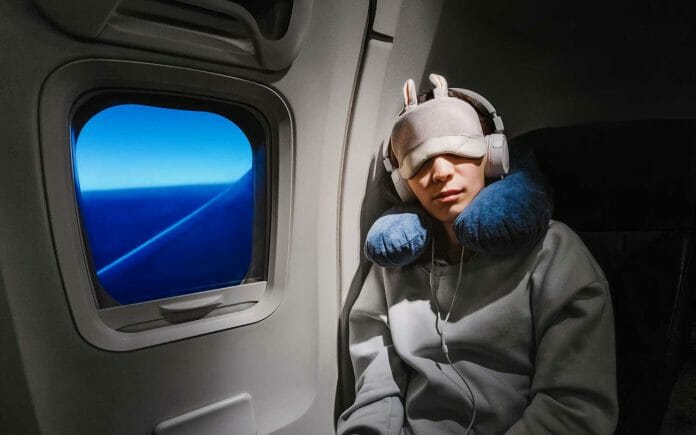Having a vacation far away can be a great way to recharge after a long, monotonous year in the office. But those who take a plane to reach that idyllic destination can attest to the terrible effects of jet lag.
Jet lag is a very common occurrence, and there are several ways you can try to make the transition to a new time zone more quickly and with fewer symptoms. Remember that your body will eventually adjust to the new time zone, but if you’re on a quick trip or are required to be highly functional quickly after your flight, these tips may be useful.
1/ Adapt quickly to your new time zone
When you arrive at your destination, try to forget your old time zone as quickly as possible. Your technology will likely update clocks automatically, but if you have a manually set watch or travel clock, set those to the new time as soon as you depart.
You’ll have trouble at your destination if you continue to eat and sleep according to the old time zone. Eat meals and go to bed according to the time at your destination.
2/ Manage sleep time
Make sure you sleep when it’s most appropriate to your new schedule. Your flight may be in the air during your destination’s nighttime, so try to log some sleep while airborne. A few things that’ll help you rest include:
noise-canceling headphones
white noise
eye masks
earplugs
comfortable travel pillows and blankets
You should also avoid the urge to nap when you arrive if it’s daytime. This can make it difficult to sleep later on.
Long-distance travel may cause dehydration, and you may even reduce water consumption during travel to avoid bathroom breaks. Think again about this choice. Proper hydration may help manage jet lag symptoms and travel fatigue.
Carry an empty water bottle through airport security and fill it up once you’re in the terminal. You can also purchase water in the terminal or request it in-flight. Continue to drink plenty of water upon your arrival.
4/ Try light
Jet lag interrupts your internal clock in part because your exposure to light changes when you travel and change time zones.
Getting outside in the sunshine can wake up your body and reduce the release of melatonin hormones that make you sleepy.
Exposing yourself to morning light will help if you need to wake up and function earlier when you travel east. Getting more light at night can be useful if you need to stay up later in your new time zone when you travel west.
You can also use a special lamp to expose yourself to light. The types of lights that may help decrease your jet lag can be in the form of a lamp, a light box, or even headgear. You may find these types of lights also advertised for seasonal affective disorder.
5/ Drink a caffeinated beverage
Consuming caffeine won’t cure jet lag, but it may be a tool to help you stay alert and focused during the daytime. One study found that 300 milligrams (mg) of slow-release caffeine enhanced alertness in those traveling eastbound.
Coffee, tea, soda, energy drinks, and even chocolate contain caffeine. Be sure to keep in mind other substances in these drinks, such as sugar, before consuming them.
Make sure to moderate or eliminate caffeine in the afternoon and evening. You don’t want to have difficulty sleeping from a combination of too much caffeine consumption and jet lag.
6/ Keep your sleeping space comfortable
Make sure that your sleeping arrangements while traveling are comfortable and facilitate proper sleep. Here are a few tips:
Check the thermostat in your room to make sure you can set it for a comfortable, cool temperature overnight.
Ensure that any phones or clocks in the room won’t ring or beep while you sleep. You can ask a hotel receptionist to move any calls to a phone service if needed. Pack comforts from home to help you sleep better.
If you sleep with a white noise machine or fan, try to find something portable that can travel with you. Bring any other lightweight comforts, such as a family photo, a favorite throw blanket, or a familiar scented lotion, to help you fall asleep.
7/ Try melatonin
Your body naturally makes melatonin to trigger sleepiness, but it’s also available as a supplement. You may want to consider melatonin to help your body get or stay sleepy while jet-lagged.
You may consider using melatonin at night if your body isn’t ready for bed. You may even take it in the early morning hours to continue sleeping if you’ve traveled west.
To avoid unwanted side effects, don’t take more than 5 mg of melatonin at a time. Because melatonin is a supplement, it isn’t regulated by the Food and Drug Administration (FDA). Use caution when trying it, and be sure to talk to your doctor about any questions you have before using it.
8/ Use medications
Talk to your doctor about whether sleep aids may help jet lag-induced insomnia. Sleep aids may help you get more rest during nighttime hours when you’re still adjusting to your new location.
You may also consider taking these aids during air travel. Keep in mind that sleep aids have side effects, so discuss the pros and cons of this solution with your doctor. Sleep aids may not decrease daytime jet-lag symptoms.
-healthline











